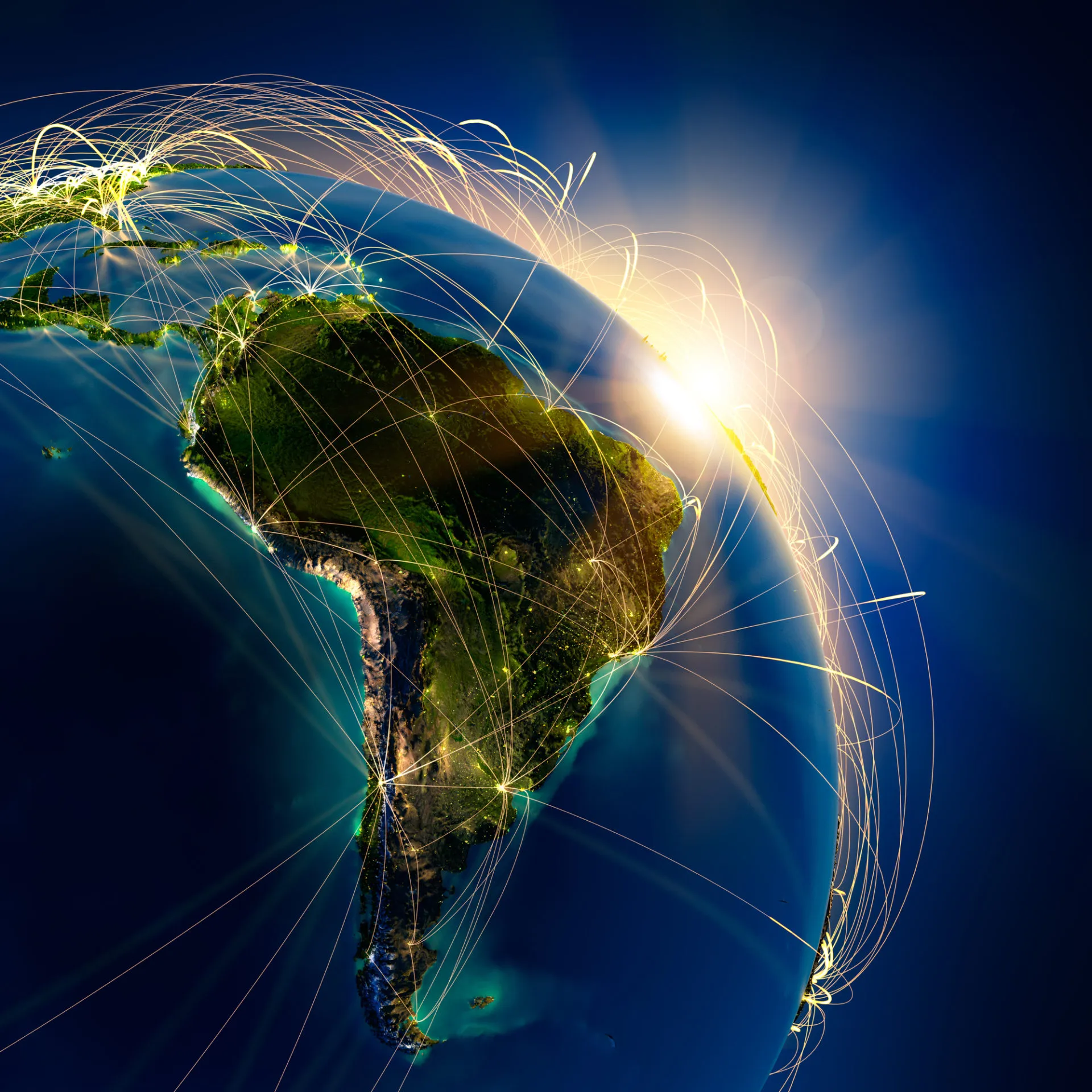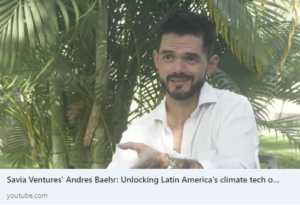A swell of ocean startups based in or sourcing from Latin America have raised $44M in recent years. Latin America has a massive coastline, large coastal populations, engineering talent and could use more support to transition to a new blue economy.

Latin America is the fastest growing region for venture capital, and a growing hub for tech and manufacturing. The blue economy is essential to Latin America, but can it become sustainable? (Photo: © by Anton Balazh)
With over 35,000 miles of beautiful and dynamic coastlines, Latin America has deep connections with the ocean — its history, economy and communities have long been intertwined with the seas. The region boasts a market twice as large as the U.S. that is increasingly interested in sustainable food sources. But what threats — and opportunities — will arise as this interdependence with the ocean faces the effects of climate change? And how do we build Latin America’s economy in a way that also supports ocean health and coastal communities?
The threats are clear. Latin America is flanked by two great oceans, the Atlantic and the Pacific, that are warming and becoming more acidic. The region is already seeing increased coastal erosion and flooding, as well as shifting precipitation patterns. And the most typical industries in Latin America’s ocean ecosystem are either neutral or extractive towards ocean conservation — oil and gas drilling, mining, aquaculture, marine shipping, and fishing.
Lat Am Ocean Stats and Industries:
- Miles of coastline: 35,000
- Major coastal cities: Buenos Aires, Rio de Janeiro, Cartagena, Panama City, Tijuana
- Coastal population: 25% of the region’s total population of 670M
- Major ocean industries: Fishing, oil and gas drilling, mining, aquaculture, shipping, ports, tourism, coastal development
- New ocean industries: Ocean data management, upcycled materials, marine genetic resources, offshore wind, underwater current energy, eco-tourism, electrification of ports and boats, sustainable aquaculture
- Ocean health startups identified: 20
- Amount raised: $44M
The opportunities, on the other hand, are still emerging. Ocean health solutions built around ocean data and intelligence, offshore wind energy, marine current power, and sustainable aquaculture will be vital for the region. We are beginning to see promising signs, with MAR+Invest launching a fund to support the health of the Mesoamerican reef, and Conservation International Ventures and Hatch are running a Women in Ocean Food Innovation Studio to support women ocean entrepreneurs from Latin America in 2023. These will be important test cases to examine opportunities and gaps in the region — a first step to attract startups and investors interested in ocean health.
Meanwhile the U.S. and Europe have seen a sea change in ocean health opportunities. Over $1B in VC funding and venture philanthropy has been raised by ocean funds, mainly in the last three years, showing rapidly increased interest in for-profit solutions to ocean health. Some major ocean-focused funds include:
- Propeller VC — $100M+, founded by the co-founder of Hubspot
- S2G Oceans — $100M+ supported by the Builder’s Vision
- SWEN Blue Capital — €170M
- Ocean 14 Capital — €150M
- Aquaspark — $500M
- Global Fund for Coral Reefs — $400M
25 Ocean Health Startups Based in or Expanding to Latin America
Karun, Plastics upcycled into products like sunglasses, Chile
Huiro Regenerative, Regenerative algae farming, Chile
Thalasso Ocean, Sargassum management, Mexico
Microterra, Aquaculture lemna for plant-based food, diverts nutrient ag runoff that cause dead zones, Mexico
Quetrox, Nanobubbles for aquaculture and water quality, Chile
Ecosea, Sustainable offshore aquaculture, Chile
Pana sea, Sea cucumber aquaculture, Panama
Carbonwave, Sargassum seaweed into high-value biomaterials, Operations in Mexico and Puerto Rico
King Kampachi, Baja offshore sustainable aquaculture, Mexico
Bureo, Recycled fishing nets into products, Chile and more countries
Inversa, Leather from invasive lionfish, 6 countries in Lat Am
TidalWatt, Underwater current energy, Brazil
Seatopia, Direct to consumer sustainable seafood, Sourcing from Mexico
Feedvax, Fish vaccines, Argentina
i4sea, Port management software, Brazil
Sway, Seaweed into bioplastics, Planned Sourcing in Lat Am
Pacific Hybreed, Resilient shellfish breeding, Expansion to Lat Am
Urchinomics, Restorative urchin farming, Expansion to Lat Am
CalWave, Breakthrough wave energy tech, Expansion to Lat Am
Aquosmic, Satellites for water quality, Multiple countries in Lat Am
Bioplaster Research, Algae-based biodegradable materials, Mexico
Quelp, Seaweed into sustainable food products, Chile
Patagonia Biotechnolgy S.A., Biotech company making seaweed into fertilizers, Chile
Coral, Biotech company making seaweed into industrial substitutes, Chile
Phycolabs, Biotech company transforming seaweed into clothing, Brazil
Many of these 25 company’s solutions bring existing, de-risked technologies, such as sustainable seaweed farming/products, to the massive Latin American market, coastline or infrastructure, while others use engineering innovation or region-specific solutions like underwater current tech, upcycled materials, or species-specific aquaculture.
Decarbonizing the Ocean Economy Key for Coastal Communities
Decarbonizing the ocean economy in Latin America will also be a major development opportunity. From small fishing pangas to large ocean tankers and major ports, the ocean economy still almost exclusively runs on fossil fuels — putting it at a severe disadvantage to variable gas prices and/or inflation. Decoupling the ocean economy worldwide from fossil fuels, particularly in Latin America, is an imperative with huge benefits to the environment by avoiding oil spills (such as the 2019 disaster in Brazil), reduces harmful emissions and has many upsides to socioeconomics. It will open doors in marine transport, small-scale sustainable fishing, aquaculture, offshore renewable energy, and eco-tourism.
Why Ocean Companies Are Looking South
The ocean field expanding to Latin America follows a larger trend. Latin America is the fastest growing market for venture capital. Both in manufacturing and tech, many groups are starting or expanding operations in Latin America. The ‘nearshoring’ impact of creating products closer to the large consumer market of the U.S. and also within matching timezones is partly behind this. Diversifying supply chains outside Asia is another. The costs of labor is often 50-70% less than in some developed countries and there are large populations of young, skilled workers. Last month Mexico actually just surpassed China as America’s largest trading partner.
Ocean Deep Tech vs. Shallow Tech Solutions
Climate and ocean VC investors often fund largely novel and unproven technologies in frontier areas that may still be years or even decades away from becoming commercially successful, or EBITDA positive. Hundreds of millions of dollars of VC money and grants have been poured into companies in the U.S. and E.U. for developing cell-based seafood, deep-sea mineral extraction, species de-extinction, and ocean wave energy. But there is also tremendous upside in deploying low-risk technologies that support conservation priorities in emerging markets right now — offshore wind, sustainable aquaculture, upcycling, pollution remediation, and sustainable fishing gear are a few examples. These solutions are not the latest hot tech trend — but maybe they don’t need to be in order to bring about tangible economic and environmental benefits with manageable risks and venture quality growth.
A Recent ‘Narwhal’ in an Emerging Market
Exciting news came last month when eFishery — an Indonesian aquaculture startup announced that they had raised a 200M Series D with an over $1B valuation becoming the first unicorn or ‘narwhal’ (narwhals = unicorns in the ocean startup field) within the aquaculture startup sector. The group provides IoT for automated feeding and marketplace B2B solutions in the large, but historically non-technical, aquaculture market in Indonesia. The news from eFishery is a fantastic example of successful international investment in the ocean field and should encourage ocean investors to look to emerging markets for good deals.
The White Space: A Lack of Ocean Health Funds in Latin America
During our research we found no early-stage VC funds (pre-seed to series A) focused on ocean health startups in Latin America, neither looking at deep tech or shallow tech solutions. As more ocean funds are launched, we need to create local partners and opportunities for ocean health solutions from emerging markets. For climate tech funding overall — only 1% is going to Latin America, and even less to ocean startups. To save the ocean we will need startups innovating along every coastline and country, and Latin America has ample opportunity to help drive the transformation to the new blue economy.
Authors:
Matt Mulrennan, Co-Founder & Partner, Savia Ventures — a seed fund backing exceptional teams solving climate change in Latin America
Karine Yuki, MBA Stanford University
Have any suggested additional ocean startups or groups that are incubating/accelerating ocean solutions in Lat Am? This will be a living article to track ocean health groups in Lat Am, so drop a comment and we will add more as we come across them (2 already added since publishing).

Matt Mulrennan
Co-Founder & Partner, Savia Ventures | CEO, KOLOSSAL. Marine scientist, Fellow of the Explorers Club, and climate + ocean tech investor.


